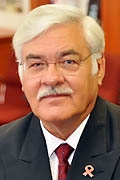Latest News Archive
Please select Category, Year, and then Month to display items
12 January 2024
|
Story Nonsindiswe Qwabe
|
Photo Sonia Small
 Since joining the UFS in 2008, Dr Grey Magaiza has worked extensively on approaches that can foster the socio-economic transformation of societies.
Since joining the UFS in 2008, Dr Grey Magaiza has worked extensively on approaches that can foster the socio-economic transformation of societies.
“The future should be one where communities can decide on their development agenda and futures. That’s the most important for me.” Dr Grey Magaiza, Deputy Director of the Centre for Gender and Africa Studies (CGAS) and Head of the Community Development programme on the Qwaqwa Campus, is passionate about capacitating communities to be agents of change and advancement. His vision for the future emphasises the empowerment of communities to take charge of their development by actively participating in decision making and the implementation of development projects that can improve their lives.
Since joining the UFS in 2008, Dr Magaiza has worked extensively on approaches that can foster the socio-economic transformation of societies. Over the years, he has crafted his research speciality into one that he is most proud of – being an interdisciplinary scientist immersed in the development of communities.
“I’m in a fortunate position of researching what I like. I say ‘fortunate’, because I’ve taken the time to understand what I’m passionate about, which is the overall field of rural livelihoods and livelihood futures – in short, community development. My research starts from an engaged university, understanding the elements that a university must use to enhance transformation and relevance to its immediate community in terms of development.”
One of the ways he has done this is by looking at social entrepreneurship as a development approach for young people in a rural setting. Through workshops with non-profit and civic organisations in Qwaqwa, Dr Magaiza has been helping these organisations to map out their needs and actively meet them through the involvement and support of external role players.
“We understand that communities are part of the national development agenda, but even that national agenda respects community knowledge and intentions and allows communities to shape their identity. A critical enabler of this is community organising. You bring back the capacity in communities to have dialogues on issues affecting them as spaces for engagement, knowledge exchange, and for people to just talk about their way forward.”
By enabling communities to define their development agenda, they can address their specific needs, challenges, and aspirations, he said. “When I look at livelihood futures, it’s quite an exciting aspect of my work – it’s like looking into a fortune tellers’ globe, because you’re not deciding for communities what they should do, but the communities themselves take those decisions.”
UFS academic joins an elite league of achievers
2010-04-14
 |
| Prof. Dingie van Rensburg |
|
Prof. Dingie van Rensburg, Director of the Centre for Health Systems Research & Development at the University of the Free State (UFS), has joined an elite list of a only few distinguished individuals who have been awarded honorary doctorates by the University of Antwerp (UA) in Belgium.
He is only the third South African to be honoured in this way by the UA, following in the footsteps of Constitutional Court Judge Albie Sachs (2000) and former State President, Nelson Mandela (2004).
He is the first social scientist from South Africa to receive this honorary doctorate from the UA – the highest academic distinction of that university. The university has previously only awarded three honorary doctorates to social scientists: Prof. Raymond Boudon, sociologist at the University of Paris-Sorbonne (1995); Prof. Robert Putman, political scientist at Harvard University (2000); and Prof. John Nash (of A Beautiful Mind fame), mathematician and economist at Massachusetts Institute of Technology (MIT) and Princeton.
The award ceremony will take place on 29 April 2010 in Antwerp.
Prof. Van Rensburg has authored, co-authored and was editor of many books/volumes, chapters in books, monographs, research reports and articles in scientific journals. He has also presented and co-presented at numerous national and international conferences; and supervised a significant number of master’s, doctoral and post-doctoral students.
In his 17 years as director of the Centre he has initiated, managed and led approximately 50 research and development projects, several of them large and long-term projects, and many of an inter-institutional and multidisciplinary nature.
In 2002 he became an NRF-rated researcher and in 2007 his rating as an established researcher was renewed. In the past two decades he received several research grants simultaneously from both the National Research Foundation and the Medical Research Foundation of South Africa, mostly for projects on Tuberculosis, HIV/Aids and antiretroviral treatment.
Prof Van Rensburg holds membership of both the Suid-Afrikaanse Akademie vir Wetenskap en Kuns and the Academy for Science of South Africa; he also served for varying periods on the Councils of both these academies. He was also a member of various health bodies of the Free State Province and the National Science and Technology Forum.
Media Release
Issued by: Mangaliso Radebe
Assistant Director: Media Liaison
Tel: 051 401 2828
Cell: 078 460 3320
E-mail: radebemt@ufs.ac.za
14 April 2010
|